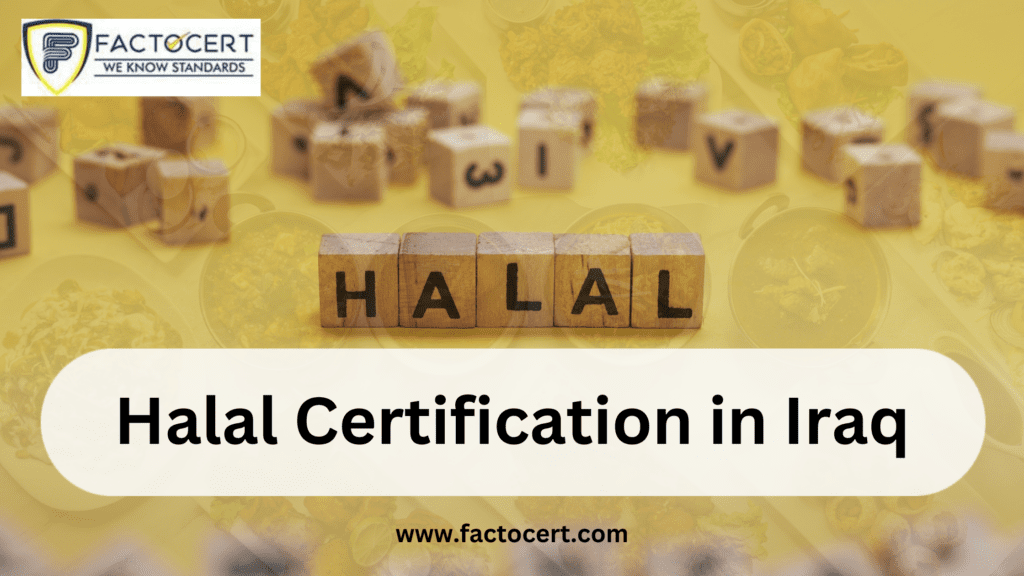Halal Certification In recent years, the global food sector has seen a substantial shift in customer preferences, with an increased demand for items that meet specific cultural and religious dietary needs. In Iraq, where the majority of the population adheres to Islamic dietary restrictions, the notion of Halal Certification has become increasingly important in defining the food business. This blog will look at the dramatic influence of Halal Certification on Iraq’s food sector.
Understanding Halal Certification:
Halal, an Arabic phrase meaning “permissible” or “lawful,” refers to foods and beverages that follow Islamic dietary regulations as outlined in the Quran. Halal Certification is the process of auditing and verifying items to ensure they meet these strict dietary rules. The source of ingredients, processing methods, and adherence to sanitation and cleanliness standards are all important factors to consider when seeking Halal Certification.
Increasing Consumer Confidence:
One of the key benefits of Halal Certification for Iraq’s food business is increased consumer confidence. The Certification ensures that the food products they purchase are consistent with their religious beliefs and dietary requirements. This Certification is especially important in countries like Iraq, where the majority of the population adheres to Islamic values, and there is a considerable demand for Halal products.
Market Expansion and Global Trade:
Halal Certification allows Iraqi food makers to enter foreign markets. As global awareness and demand for Halal products rise, holding the Certification provides a strategic advantage for enterprises seeking to enter the lucrative global Halal market. This not only broadens the reach of Iraqi food items, but also strengthens the country’s reputation as a dependable source of Halal-compliant commodities.
Competitive Edge:
In a competitive industry, Halal Certification can be a significant differentiation for food enterprises. It indicates a dedication to excellence, openness, and religious values. As consumers become more discerning and health-conscious, the Halal label may influence their purchase decisions, giving certified items a competitive advantage over non-certified alternatives.
Local Economic Growth:
The process of getting and maintaining Halal Certification entails adhering to specified norms and rules, hence providing a systematic framework for the food business. This, in turn, leads to the establishment of a strong supply chain, from raw material sourcing to manufacturing and distribution. The expansion of the Halal food sector has a knock-on impact on allied businesses, promoting economic development and creating job opportunities throughout the country.
Enhanced Food Safety:
Halal Certification is more than just religious compliance; it also requires strict cleanliness and safety standards. To become certified, food manufacturers must follow rules that ensure the cleanliness and purity of the entire manufacturing process. This emphasis on quality and safety benefits consumers by lowering the danger of contamination and guaranteeing that Halal products achieve the highest level of perfection.
Challenges and opportunities:
While Halal Certification provides several benefits for the Iraqi food business, it also poses obstacles. Obtaining accreditation may be a difficult and expensive process for firms, especially smaller ones. Furthermore, maintaining a constant supply chain of Halal-compliant components presents logistical hurdles.
However, these challenges provide opportunities for growth and innovation. Government backing, industry collaboration, and the establishment of local Halal Certification bodies can help simplify the Certification process and make it more accessible to businesses of all sizes. Investment in R&D can result in the production of new Halal-compliant products, increasing the diversity of options for consumers.
Why choose Factocert Halal Certification in Iraq?
Factocert is one of the top leading Halal Certification providers in Iraq. We provide the best Halal Consultants in iraq, Baghdad, Mosul, Basra, Erbil, Najaf, Karbala, and other major cities in Iraq.factocert is the most trusted Halal Certification Bodies in Iraq visit our website www.factocert.com or contact us at contact@factocert.com for service of implementation, training, auditing, and registration.We provide different ISO Standards like ISO 27001,ISO 9001,ISO 45001 ,ISO 14001,ISO 13485,ISO 22000,and ISO 17025
Conclusion:
Halal Certification has had a substantial and complex impact on the Iraqi food market. The benefits are obvious, ranging from increasing customer confidence and market reach to supporting economic growth and assuring food safety. As the global demand for Halal products grows, Certification becomes not only a religious responsibility but also a strategic need for businesses looking to prosper in a competitive and changing food industry. Embracing Halal Certification is more than just meeting a requirement; it is about laying the groundwork for long-term and inclusive growth in Iraq’s thriving food industry.
For More information visit : Halal Certification in Iraq





